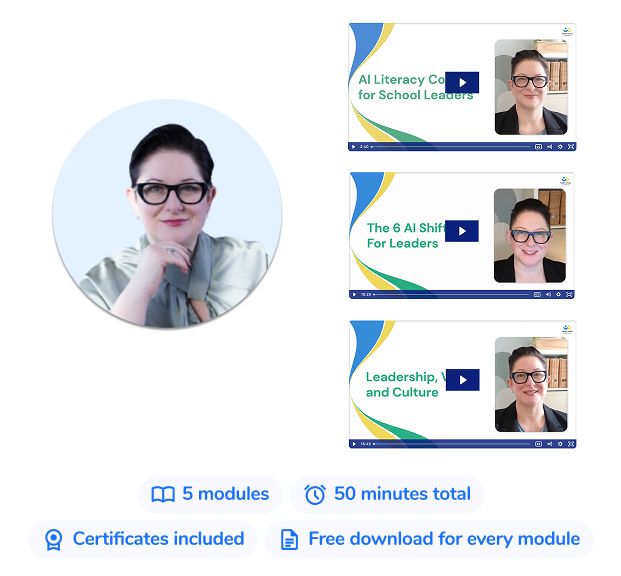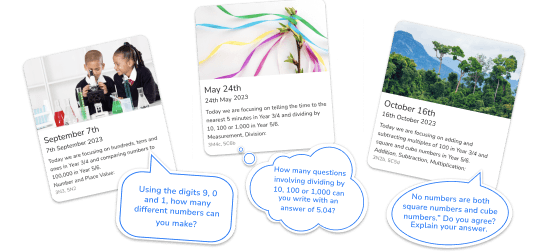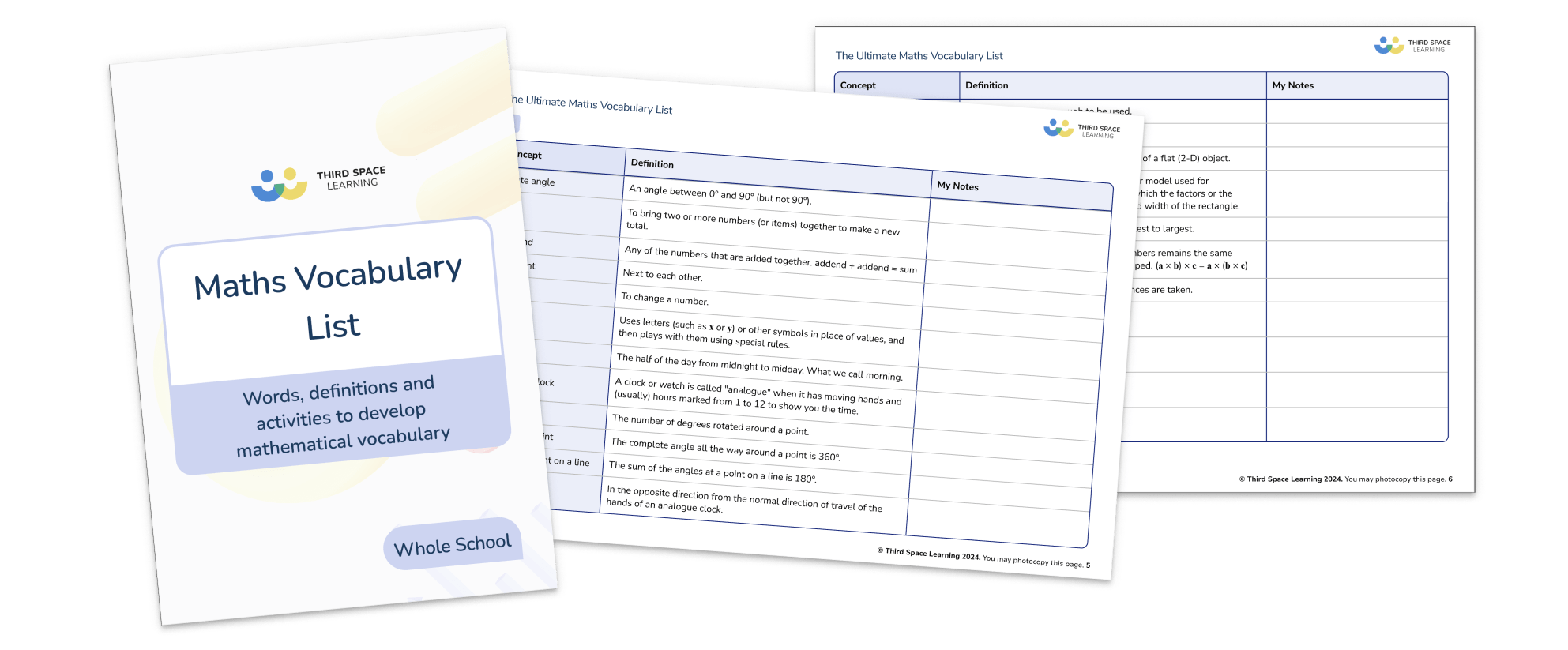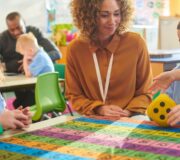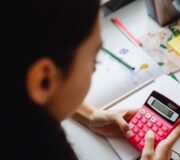Using Maths Vocabulary Games And Activities To Systematically Develop Fluency & Reasoning At KS2
Using some simple maths vocabulary games and activities that build up pupils’ confidence in using key terms correctly, can transform their confidence in all areas of maths.
As your pupils develop a variety of maths words and terminology, they will also progress in their reasoning skills – and provide lots of evidence for you to identify. The days of no talking in lessons are long gone thank goodness! Instead, the challenge now is to encourage children to talk mathematically, using the right vocabulary, in the right contexts.
Maths vocabulary in the classroom
Mathematics is a language – one of symbols and numbers. It is also expressed and explained through written and spoken words. For our pupils to really achieve maths mastery it is essential that they are able to recognise, understand and apply a wide range of vocabulary.
This article and free download provides you with all the maths vocabulary terms you should be teaching your class during KS2. The download even leaves space for you to add in the additional terms you come across.
Whilst this maths language may seem simple to us, remember the average child will have started primary school with a receptive vocabulary of 2,100 – 2,200 words.
By the time they leave at the age of eleven, their maths language in year 6 will have increased to accommodate about 50,000 words. They have lots to learn during their time in primary school and it is no wonder at times they may struggle to link mathematical concepts, symbols and new vocabulary together.
Maths vocabulary can create stumbling blocks in applied learning
As teachers, we can all think of those moments in class, when having taught a topic for days or weeks, a child is stumped as soon as they are given a word problem which they have to apply their learning to.
One of the main reasons a child may struggle in this situation is the difficulty with understanding language and vocabulary. Sometimes it is a problem with new and unfamiliar words, sometimes it is learning that familiar words can have a different meaning in a mathematical context.
For example, a pupil may describe the difference between 7 and 23, as “one has straight lines and the other has curved lines”. In this situation, the teacher clearly needs to reinforce the meaning of the word, “difference”.
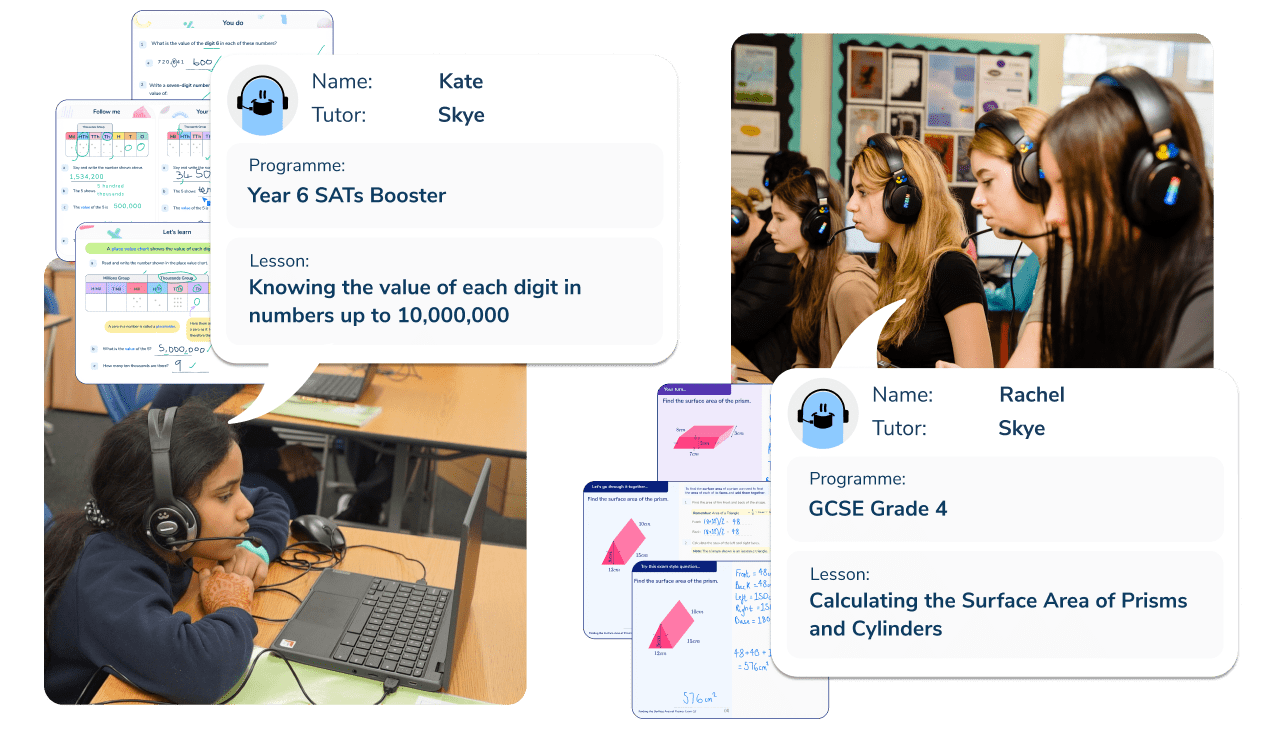
Meet Skye, the voice-based AI tutor making maths success possible for every student.
Built by teachers and maths experts, Skye uses the same pedagogy, curriculum and lesson structure as our traditional tutoring.
But, with more flexibility and a lower cost, schools can scale online maths tutoring to support every student who needs it.
Watch Skye in actionMathematical reasoning
Another situation often encountered is when a child can quickly calculate the answer to a challenging problem but when asked to explain their answer, replies “I dunno, I just did it in my head.”
While it is encouraging that the pupil in question can confidently find the answer, they need to be able to explain their thinking. This is a key skill in mathematics and the 2014 National curriculum specifically states that pupils must learn to “reason mathematically by following a line of enquiry, conjecturing relationships and generalisations, and developing an argument, justification or proof using mathematical language”.
To find out more about how reasoning and fluent mathematical vocabulary can have a positive impact on pupil progress, read our blog on the interactions between Fluency, Reasoning and Problem Solving.
Reasoning is also a key aspect of the SATs – the maths SATs have two papers devoted to it (compared to one for arithmetic), and these papers feature multiple different types of reasoning-based questions for pupils to recognise and work on. Our blog of 35 Year 6 Maths Reasoning Questions pulls apart each of these question types, explaining how pupils should approach them and what steps may be required to solve them.
Maths Vocabulary List
10 maths games and activities to develop mathematical vocabulary across the school and prepare pupils for their KS2 SATs and transition to secondary school maths.
Download Free Now!Maths vocabulary activities to include in your teaching
It is evident that a rich spoken language environment should be a key element included in any successful maths lesson. What’s more, its positive impact is not limited to the maths lesson and has an influence on a pupil’s cognitive, social and linguistic development across the whole curriculum.
So, in the primary classroom, what can we do to help our pupils understand new maths terminology?
1. Introduce new key vocabulary at the start of a topic
Plan the introduction of new words from the new curriculum in a suitable context, with relevant real objects, mathematical apparatus, pictures and/or diagrams, explaining their meanings carefully.
Some topics lend themselves more easily to this, such as using cakes or pizzas to demonstrate fractions, but it is important to be creative and find an interesting way of firing the imagination for every topic.
One of the best ways to introduce new vocabulary into the classroom is through a list of maths vocabulary which pupils can build on themselves. Set aside an area as an interactive “Maths Working Wall”. This should reflect the learning that week. The teacher or pupils can add to it throughout the unit of work, pinning up words, drawings, photos and even objects to build a picture of the learning journey.
Take a look at the Third Space Learning vocab list which contains the 96 keywords every pupil needs to know by year 6 as a source of inspiration.
This is a very versatile resource that you can use in any way you wish, from using each page as a Maths vocabulary poster to using it as a diagnostic tool to test gaps in pupils’ knowledge.
2. Make talk partners a routine element of a lesson
Talk partners are a super way to get children using mathematical vocabulary, providing the opportunity for every pupil to engage in in mathematical discussion in response to open questions.
Allocating each child a set partner at the start of a term or unit of work ensures time is not lost in lessons and allows you to carefully match pupils, ideally pairing more confident and able learners with those who need a bit more support. Bear in mind that children need to hear how vocabulary is used effectively before they have a go themselves.
Teachers should first provide a clear model of how to use the new vocabulary in context, ideally reinforced with concrete and pictorial resources. The language should be used at the same time as showing the example to help link the abstract and concrete as clearly as possible.
3. Allow time and space for pupils to engage in mathematical conversations
As maths teachers we are familiar with the importance of scaffolding work to support learners and guiding pupils through a process to find a solution. Yet at the same time we need to make sure that we give children the time and space to construct solutions for themselves through talk.
The key word is conversation. This should be a two way process, involving the pupil, as well as the teacher, and we need to be careful that we do not end up wasting any valuable one to one time, for example:
Teacher: “How have you done these?”
Pupil: [writes out calculation]
Teacher: “Oh, I see, you’ve put the numbers underneath each other”
Pupil: [nods]
Teacher: “Ah and then you added them”
Pupil: “yes”
The teacher has tried to check their understanding and response but a vital opportunity for developing his vocabulary and language has been missed. It is important to avoid the temptation to control the communication to get to a mathematical end that you have predetermined but encourage mathematical thinking instead.
When new maths language is first introduced it can be useful to provide a talking frame to scaffold discussion. This is effectively a short script of one or two sentences which uses a key word, leaving gaps for the children to fill themselves when applying to different examples. It shows the pupils exactly how and where the vocabulary is used and is particularly useful for less confident learners.
4. Always ask How and Why
The conversation in the example above could have been vastly improved by making use of these two simple words: how, and why. Effective questioning in the classroom encourages pupils to verbalise their understanding of a concept and develop their reasoning skills.
Struggling pupils could be supported in their responses by giving them a word bank to refer to when answering.
One of the luxuries of one to one tutoring is the additional time and focused attention that can be spent on pupils.
Skye, Third Space Learning’s AI maths tutor, is designed to support pupils by exploring their answers and asking for further explanations, similar to a human tutor. The conversational, voice-based approach encourages pupils to articulate their mathematical thinking and reasoning aloud. Skye has been trained by maths teachers to replicate the behaviours of a pedagogically-trained tutor, using targeted strategies like scaffolding and reflective feedback.
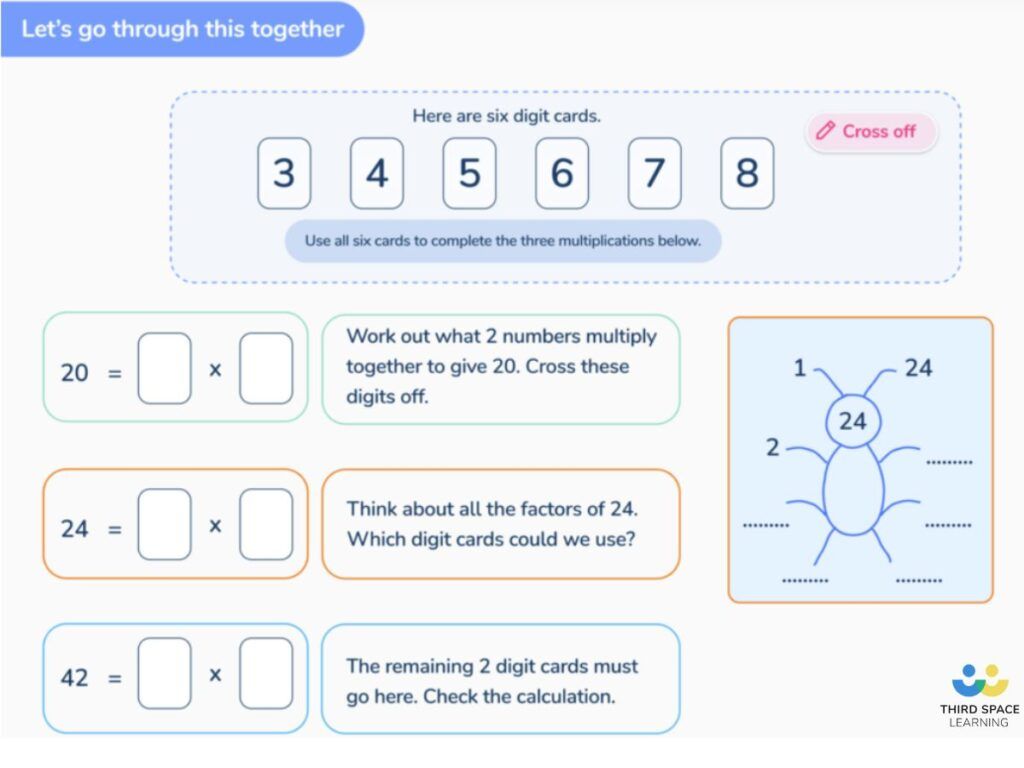
5. Ask open questions
Asking closed questions limits the scope of a pupil’s response to a correct or incorrect answer and deprives them of the opportunity to talk through their thinking.
By using open questions we encourage pupils to explain the steps they have made and make use of any new maths vocabulary they have learnt. It can be helpful to develop a bank of effective questions to refer back to at any time in lessons.
10 Tried and Tested Maths Vocabulary Games
You’ll be amazed at how fun developing your KS1 & KS2 maths vocabulary can be.
- Call My Bluff – As in the old TV series, give the children Mathematical vocabulary with a choice of definitions. They then use dictionaries to find the correct definition.
- Ready, Steady, Look – Children race to find specific words in their dictionaries. This develops skills in the use of dictionaries at the same time as developing their awareness of Mathematical vocabulary.
- Give us a Clue – Guess the word from its definition then confirm whether you’re right by checking in the dictionary.
- Speechless – Using pencil and paper, but without speaking or writing any words, define a word by drawing examples.
- Crosswords – Design and make crosswords using Mathematical vocabulary.
- Countdown – Give anagrams of a word, with its definition, and let the children race against the clock to solve the anagram.
- Maths Attack – Develop understanding of particular concepts and specialist vocabulary by asking children to develop the definitions and examples given in the dictionary. Produce a fact sheet or poster with as many examples as possible to define the word.
- Maths Hangman – Play the age-old game using only Maths vocabulary.
- Maths Mastermind – Challenge children to read maths dictionaries to try to find words others might not know. Play a Mastermind-type game with children taking turns in the hot seat. Use this primary maths dictionary for kids to start you off.
- The Yes/No game – A child, or team of children, chooses a word and others have to ask questions in an attempt to define the word.
Looking for fun games and activities to boost pupils’ learning?
We’ve got several articles sharing teacher approved maths activities and fun maths games, including KS2 maths games, KS1 maths games and KS3 maths games for all maths topics and a set of 35 times tables games and multiplication games you’ll want to bookmark whichever year group you teach!
This blog has introduced us to the challenges that mathematical vocabulary and language can present to our pupils and some ways you can make it easier for them.
What strategies do you use to develop your pupils’ mathematical language in your own classroom?
Further relevant articles for your maths mastery journey
- White Rose Maths Hub: How To Find The Resources You Need
- Maths Mastery Toolkit for Year 1 to Year 6
- Year 6 Word Problems and How To Solve Them Using Bar Modelling Techniques
DO YOU HAVE STUDENTS WHO NEED MORE SUPPORT IN MATHS?
Skye – our AI maths tutor built by teachers – gives students personalised one-to-one lessons that address learning gaps and build confidence.
Since 2013 we’ve taught over 2 million hours of maths lessons to more than 170,000 students to help them become fluent, able mathematicians.
Explore our AI maths tutoring or find out about an online maths tutor for your school.
